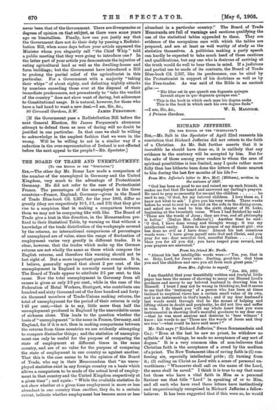[To THE EDITOR OF THE "SPECTATOR. " ] SIR,—The other day Mr.
Bonar Law made a comparison of the number of the unemployed in Germany and the United
Kingdom, very much to the advantage of Protectionist Germany. He did not refer to the case of Protectionist France. The percentages of the unemployed in the three countries—France, England, Germany—given in the Board of Trade Blue-book Cd. 2,337, for the year 1903, differ so greatly (they are respectively 101, 5.1, and 2.3) that they give
rise to a suspicion that in making a comparison between them we may not be comparing like with like. The Board of Trade give a hint in this direction, in the Memorandum pre- fixed to their Statistical Table, by warning us that without a knowledge of the trade distribution of the workpeople covered by the returns, no international comparisons of percentages of unemployed are of value, since the range of fluctuation of employment varies very greatly in different trades. It is clear, however, that the trades which make up the German returns are not wholly the same as those which compose the English returns, and therefore this warning should not be lost sight of. But a more important question remains. It is, I believe, generally agreed that about 2 per cent, of the unemployment in England is normally caused by sickness. The Board of Trade appear to attribute 2.5 per cent, to this cause. Now the total unemployment in Germany from all causes is given as only 2'3 per cent., while in the case of the Federation of Metal Workers, Stuttgart, who contribute one hundred and sixty thousand out of the four hundred and forty- six thousand members of Trade-Unions making returns, the total of unemployment for the period of their returns is only 1.43 per cent,—that is to say, little more than half the unemployment produced in England by the unavoidable cause of sickness alone. This leads to the question whether the basis of " unemployment " is the same in France, Germany, and England, for if it is not, then in making comparisons between the returns from these countries we are evidently attempting to compare dissimilar things ; and the statistics of unemploy- ment can only be useful for the purpose of comparing the state of employment at different times in the same country, and are of no value for the purpose of comparing the state of employment in one country as against another. That this is the case seems to be the opinion of the Board of Trade, who say in their Memorandum that "no unem- ployed statistics exist in any foreign country on a basis which allows a comparison to be made of the actual level of employ- ment in that country and the United Kingdom respectively at a given time" ; and again : " While the available statistics do not show whether at a given time employment is more or less abundant in one country than another, they do, to a certain extent, indicate whether employment has become more or less abundant in a particular country." The Board of Trade Memoranda are full of warnings and caution* qualifying the use of the statistical tables appended to them. They are evidence of the scrupulous care with which the tables are prepared, and are at least as well worthy of study as the statistics themselves. A politician making a party speech can hardly be expected to take much heed of these cautions and qualifications, but any one who is desirous of arriving at the truth would do well to bear them in mind. If a judicious and partial use be made of its contents, the Board of Trade Blue-book Cd. 2,337, like its predecessor, can be cited by the Protectionist in support of his doctrines as well as by the Free-trader. As was said of the Bible in an ancient "Hie liber eat in quo qunrit sua dogmata quisque Invenit atque in quo dogmata quisque sua."
" This is the book in which each man his dogma seeks This is the book in which each his own dogma finds."
—I am, Sir, &c., W. R. MencoLx.
1 Princes Gardens.










































 Previous page
Previous page